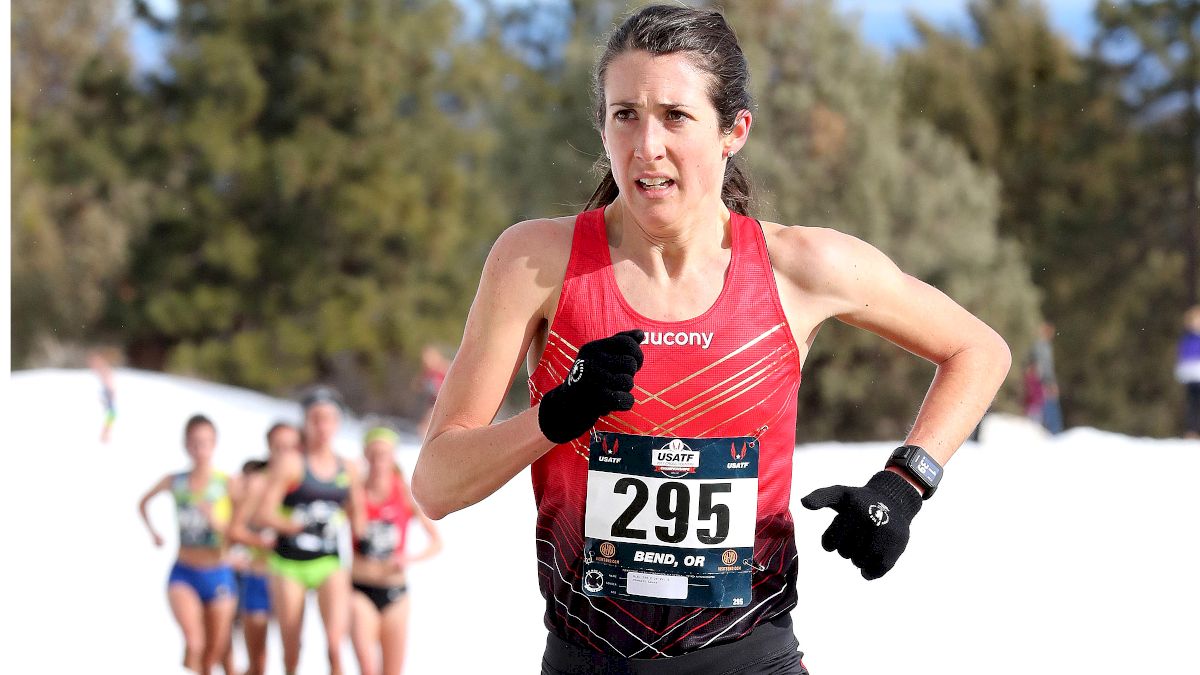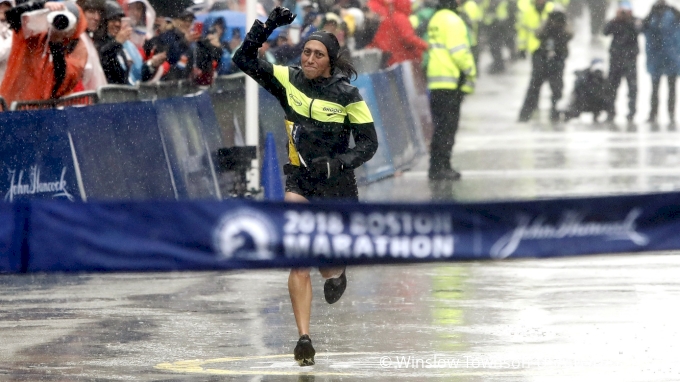After Year-Long Layoff, Marathoner Laura Thweatt Is Back
After Year-Long Layoff, Marathoner Laura Thweatt Is Back
2:25 marathoner Laura Thweatt is back to racing after battling osteitis pubis for the past year.

There's at least one top U.S. marathoner who didn't compete in Boston this week.
Laura Thweatt has barely raced—or even, for that matter, logged normal mileage—in the past calendar year since clocking 2:25:38 for sixth place at the 2017 London Marathon. That time made her the fifth-fastest American in history on a record-eligible course—now sixth, behind Amy Cragg's 2:21 in Tokyo earlier this year, and eighth including times from the Boston Marathon.
The 29-year-old Saucony-sponsored member of the Boulder Track Club is just now returning from osteitis pubis, an inflammation of the pubic bones at the center of the pelvis. The chronic groin pain necessitated an 11-month layover from racing and seven months completely off from running, including a disappointing withdrawal from the IAAF World Championships marathon.
"For anyone who is injured and has to be sidelined, it's difficult," she said of watching her peers exceed expectations in what's been a historic two-year span in American women's marathoning.
A quick cheat sheet:
Amy Cragg earned bronze in the IAAF World Championships marathon last summer.
Jordan Hasay earned consecutive third-place finishes at Abbott World Major Marathons in the first-ever marathons of her career; her 2:23:00 in Boston was the fastest debut American performance by three minutes, and her 2:20:57 in Chicago was the second-fastest American performance of all time.
Shalane Flanagan became the first American woman in 40 years to win the New York City Marathon last November.
And, most recently, Des Linden broke the 33-year American women's title drought at the Boston Marathon on Monday by persevering through historically poor conditions.

"Time doesn't stop and the world doesn't stop," Thweatt said over the phone last week from her home in Colorado. "It feels like it has for you, but everyone else has to keep going. It's hard, but it's also very cool and inspiring to watch all these women break through barriers and—it makes me excited to come back myself."
And now, inconceivably, she is back.
In March, the University of Colorado alum won her first race in 48 weeks, the Bank of America Shamrock Shuffle 8K, by 44 seconds over her Boulder TC teammate, Janelle Lincks. She finished in 26:02.
4/23/17 - 6th @LondonMarathon 2:25.38
— Laura Thweatt (@thweatt11) March 24, 2018
5/11/17 - PRP injection.
5/31/17 - Withdrew from @iaaforg London World Champs Marathon.
10/15/17 - First day back running of 3 x 1min run/ 9min walk.
Tomorrows @ChiShuffle will be my 1st race in 48 weeks/ 336 days!
Never stop believing!
Next, Thweatt will run as part of the elite field in the UAE Healthy Kidney 10K, presented by the New York Road Runners (NYRR) next Sunday, April 29. She last competed at the Healthy Kidney 10K in 2016, where she finished as the top American in sixth place with a time of 33:20.
Even then, there were warning signs of the condition that would derail her career.
It's hard for Thweatt to pinpoint when exactly her condition began and ended, or if it's officially ended at all—"as of now, I would say I'm 100 percent but the only way to know if it's fully gone is to get another image done"—but she remembers the specific feeling of a dull, achey feeling in her groin dating back to her recovery from her debut marathon, New York in 2015, then continuously popping up as she focused her workouts on shorter efforts in preparation to compete at the 2016 U.S. Olympic Trials in the 5K and 10K.
"Obviously, I was sore with the injury—but everything was sore, and everything hurt. So I didn't think much of it," she said. "You get to a point where you're training so much that you always have aches and pains and you get good at managing it."
After finishing fifth in the 10K and eighth in her 5K prelim at the Olympic Trials, Thweatt took two weeks off from running.
But the pain persisted.
Her chiropractor suggested she might be suffering from osteitis pubis, and she saw a physical therapist who agreed.
There is no "cure" for the condition other than complete rest, which is impossible for an actively competing distance runner. So she and her team waited it out and didn't even get an MRI done to confirm its existence until nearly a year later, after she ran 2:25 in London—meaning that she essentially trained through it for two years.
"It had flared up the last six weeks or so of my London block and I was able to train and manage it, but it was getting more and more uncomfortable and starting to affect everyday life instead of just while I'm running," she said. "I honestly got through the race without even thinking about the injury—which I feel really lucky about—and then I took two weeks off afterward.
"It wasn't until I started to run again to see if we could turn it around for the world championships that I was just like, 'No way.' I couldn't do a 20-minute run without significant, achy, deep pain. It kind of felt like a stress fracture and that's the pain I had had on and off in my build-up to London."
Thweatt and her team, which includes coach Lee Troop—a three-time Olympian for Australia—finally got an MRI and shut things down.
The image showed that Thweatt has a significant leg length discrepancy, which she believes caused a flared rotation in her pelvis. She now completes a leg-focused strength routine two times a week to target her hips and glutes as well as lower abdominals.
Sometimes, the toughest part of enduring an unusual injury isn't the never-ending aqua jogging—"I really contemplated getting a waterproof iPod, but I didn't do it so most of the time I was just out there with my thoughts. I don't know if that's good or bad!"—but the feelings of solitude, especially when few people have ever even heard of your condition.
Thweatt did find two unlikely allies in former Boulder TC coach Kathy Butler and in social media.
Butler, who now leads the Run Boulder Athletic Club, was diagnosed with osteitis pubis in 2002, in what would be the middle of her running career. The five-time NCAA champion for the University of Wisconsin had represented Canada in the 5K at the 1996 Olympic Games in Atlanta but missed the team in 2000.
"My [time off from running] was similar to Laura—in the range of around a year—and I think, in some ways, it got me more motivated to come back after missing such a large chunk of time," Butler said. "The break can also be good after so many years of running."
Butler went on to represent Great Britain at the 2004 Athens Games in the 10K and later make a successful transition to the marathon, where she recorded a personal best of 2:28:39 at the 2006 Chicago Marathon.
"It's so different for everyone," Thweatt said. "[Kathy] was on crutches and she took more time off than I did. I could talk to her about what she did. Social media I'm not always a huge fan of, but I liked it over this injury because so many people reached out to me who struggled with it. I had been flying blind with it [at first], but it seems like it's more common than I thought."
Butler says she never suffered a recurrence of osteitis pubis and worked through 100 to 115-mile weeks during the height of her marathoning career.
"From Laura's point of view, if anything, it's been good timing," Butler said, "to take a little break now and get back for the next Olympics [in 2020]. If it had been this year, that would be getting a little late."
Thweatt has nearly two years before the U.S. Olympic Marathon Trials. Until then, she's taking it one step at a time.
Of her next race through hilly Central Park, she said, "I just want to be in mix, be competitive and get that mentality back again."